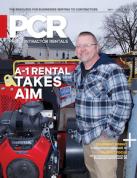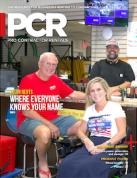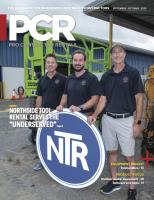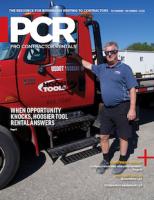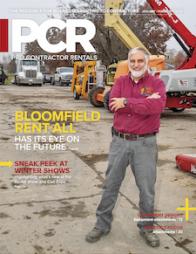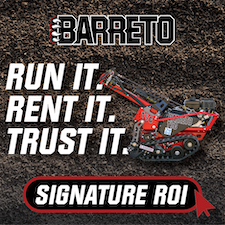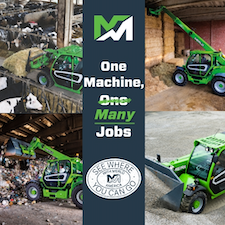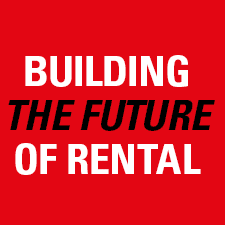Rental Center: Change is constant
With a 73-year history, Pete Murphy, second-generation owner of Murphy’s Contractor Equipment says the business is constantly evolving.
When Pete Murphy’s father, Frank, became disillusioned with work as a certified public accountant, he went to work for a rental business in suburban Chicago. In 1951, he borrowed $500 from his brother, who was a doctor, and started Murphy’s Contractor Equipment in Maywood, Illinois, a Chicago suburb.
“That store was a two-bay garage with a small yard. It also had mobile homes behind it. After about six months, my dad discovered that all the mobile homes were connected to his electrical meter, and he was paying for the electricity for all of the units,” Murphy recalls.
Frank Murphy worked out of that location until 1969, when the business moved to its present location in River Grove, Illinois. “Back then, there were no skid steer loaders or mini excavators; power tools were mostly pneumatic. We had scissor lifts, but we have gotten away from them because of the liability issues,” Pete says.
Over the years, customers have changed. In the early years, there were plenty of new construction projects as the Chicagoland footprint expanded in all directions away from Lake Michigan. Many of those jobs entailed demolition, which required extensive use of concrete-breaking equipment. Today, those jobs have increasingly become repair-, rebuild-, replace-type jobs requiring smaller equipment that can work in tight spaces. Most of Murphy’s customers are small- to- medium-sized contractors working in the landscape, concrete and plumbing trades.
“Today, we’re seeing a move toward battery-powered tools and equipment. We still rent many electric rotary hammers, but we’re also seeing more contractors buying their own rotary hammers instead of renting them,” Murphy says. “They’re coming down in price and they are now considered disposable because it costs too much to fix them.”
Serving contractors in the Chicagoland area, Murphy’s finds that most customers pick up rentals at the store, although it does deliver equipment to those who request it. “Some prefer to have equipment delivered because it keeps their crews working instead of picking up equipment and getting waylaid off the site due to traffic or long breaks,” he says.
Today, the fleet of equipment at Murphy’s Equipment Rental is dominated by mini excavators, skid steer loaders, conveyors, concrete buggies and concrete tools such as gas-powered saws. He has just over 300 pieces of equipment in the fleet, which on average, is between two and five years old. “We do about a million dollars in sales and another million dollars in rental each year,” Murphy adds.
While business has been relatively stable over the years, Murphy has noted an uptick in 2024; business is up about 25 percent over 2023, which was down nine percent. “Being an independent, we can be more flexible and offer better service on a personal level. Most of our customers are second- or third-generation contractors. They are small-to medium-sized contractors, and they appreciate our give-and-take approach to flexibility. “
Presently, the Murphy Equipment Rental staff is made up of Murphy, his wife, Susan, who handles bookkeeping and two mechanics and one driver who is in training to become a mechanic. “We used to have a total of six people on staff, but two have retired and we’ve not found anyone to replace them at this time. Our newest employee has been with us for almost a year and he’s learning maintenance and repair from the ground up. He is also learning about equipment operation. He was hired as a driver, and every rental that gets delivered must be gone over with the operator on how to operate it. We require that we go over the equipment step by step, even if the operator says they know how to operate it. It heads off most call-backs and repairs due to misuse,” Murphy says.
The staff uses winter months when the rental pace is slower to take online courses or undergo one-on-one training to further develop their skills. “We use American Rental Association for driver and safety training as well as any online seminars it offers,” he adds.
Shift in supplier support
Murphy says that over the years, the support available from equipment manufacturers has changed. “Manufacturer’s salespeople are now less knowledgeable about the equipment they are selling and they don’t seem to stay in their positions for very long. At trade shows, it seems those who are working in the trade show booths are more interested in talking with each other than visiting with booth visitors. Before I go to a show, I talk with the local salespeople to find out what I should look forward to seeing at the show and then seek that out at the show if I am interested,” he says.
Manufacturers have also made it more challenging to get on-hone or online support. “More and more, they are requiring online ordering and if you have a question or difficulty with the online ordering system, the support comes from another country. These support people are very polite, but you often must repeat things several times to communicate with them. An order for two or three things could take several minutes. No one takes orders over the fax anymore,” he says. “Several manufacturers are requiring an order of a certain dollar value or else they add on a service fee.”
Survival of the fittest
Over the years, Murphy has weeded out equipment in the fleet that have proven to be high maintenance and has a low ROI. “We had trenchers on our fleet in the past but have gotten rid of them because they required lots of service and were down for repairs due to damage while on rent. There is so much debris in soil that’s not seen until the trencher hits it, which would damage the trencher. We finally worked them out of our fleet,” he says.
“We’ve also seen a huge decline in demand for compressors and we don’t offer the wide range of pneumatic accessories as we had in the past because demand has waned and they tended to be high-maintenance items.” He’s found the same is true for light towers; newer LED models are expensive and difficult to cash-flow.
As Murphy ponders his next equipment moves, he believes he will invest in slightly larger mini-excavator models and possibly electric power buggies because demand for those units is increasing as contractors work more indoors, which comes with air quality concerns. “I don’t lose sleep over the business anymore. Over the years, I’ve looked at our maintenance costs and the return from each piece of equipment and weed out those that were higher maintenance and yielded lower returns,” he concludes.




